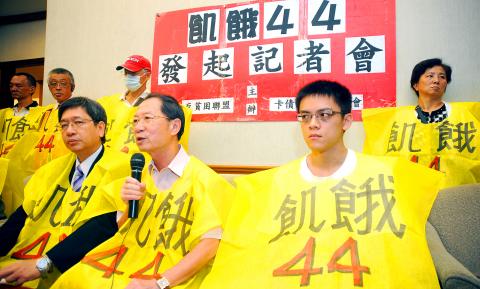Activists from the Anti-Poverty Alliance, which comprises 13 civic groups, held a press conference at the legislature in Taipei yesterday urging legislators to address the problem of the widening disparity between rich and poor in Taiwan.
They also announced plans for two 44-hour hunger strikes that will begin on Sunday.
Anti-Poverty Alliance representative Chien Hsi-chieh , a former Democratic Progressive Party lawmaker, said the gap between rich and poor is expanding in Taiwan, just like in the US and Europe.

Photo: Liu Hsin-de, Taipei Times
Taiwan’s economic growth rate last year was 10.8 percent and labor productivity increased by 16 percent, but wages decreased by 11 percent, the alliance said.
It said the total income of employees accounted for only 44 percent of GDP, which was lower than in many other countries.
Twenty-five people from Taiwan were listed on Forbes’ latest list of the world’s richest people, and the wealth of the top 10 richest people in the nation has increased from US$30 billion to US$40.7 billion, Chien said.
However, there are about 1.04 million workers in Taiwan who receive less than NT$20,000 per month, he added.
He also questioned why the government gave preferential treatment, such as a sales tax exemption, to banks but not to other sectors, and said mounting frustration over the plight of the average wage earner would express itself as it had in recent weeks on Wall Street.
“Occupy Wall Street is not a single incident, but is spreading around the world,” Chien said.
Chien said the alliance would hold two “44-Hour Famine” hunger strikes to raise awareness about the unfair distribution of wealth in the country, with workers not receiving their deserved share.
The hunger strikes will take place in front of the legislature. The first will run from Sunday to Tuesday and the second will run from Tuesday to Thursday.
The groups will also protest against the government giving tax relief to enterprises when the working poor are becoming poorer, and they want to experience poverty through fasting.
Chen Fang-yu (陳方隅), a representative from a group called “Young people want to be rich,” said that about one-fourth of young people in their 20s work as dispatch workers or as hourly wage workers, often with low incomes, long working hours and no welfare benefits.
He said with incomes so low and housing prices high, “who still wants to get married and have children?”
Lin Yung-sung (林永頌), an attorney who advises victims of credit card debt, said some workers are only paid about NT$20,000 per month and had to pay between NT$4,000 and NT$5,000 per month to labor dispatch agencies.
Lin said that as many as 1.04 million Taiwanese — or 15 percent of the working population — earn less than NT$20,000 a month.
That means there are 220,000 more people in that income group than in 2008, at the height of the global financial crisis, Lin said.
The alliance said unemployment and low incomes were the roots of poverty and called on legislators to amend the Statute For Consumer Debt Clearance (消費者債務清理條例), regulations on student loans and the Housing Act (住宅法) during the current legislative session.
The alliance also voiced support for the “Occupy Taipei” rally that is scheduled for Saturday outside Taipei 101.
Additional reporting by CNA

Chinese Nationalist Party (KMT) Chairman Eric Chu (朱立倫), spokeswoman Yang Chih-yu (楊智伃) and Legislator Hsieh Lung-chieh (謝龍介) would be summoned by police for questioning for leading an illegal assembly on Thursday evening last week, Minister of the Interior Liu Shyh-fang (劉世芳) said today. The three KMT officials led an assembly outside the Taipei City Prosecutors’ Office, a restricted area where public assembly is not allowed, protesting the questioning of several KMT staff and searches of KMT headquarters and offices in a recall petition forgery case. Chu, Yang and Hsieh are all suspected of contravening the Assembly and Parade Act (集會遊行法) by holding

PRAISE: Japanese visitor Takashi Kubota said the Taiwanese temple architecture images showcased in the AI Art Gallery were the most impressive displays he saw Taiwan does not have an official pavilion at the World Expo in Osaka, Japan, because of its diplomatic predicament, but the government-backed Tech World pavilion is drawing interest with its unique recreations of works by Taiwanese artists. The pavilion features an artificial intelligence (AI)-based art gallery showcasing works of famous Taiwanese artists from the Japanese colonial period using innovative technologies. Among its main simulated displays are Eastern gouache paintings by Chen Chin (陳進), Lin Yu-shan (林玉山) and Kuo Hsueh-hu (郭雪湖), who were the three young Taiwanese painters selected for the East Asian Painting exhibition in 1927. Gouache is a water-based

Taiwan would welcome the return of Honduras as a diplomatic ally if its next president decides to make such a move, Minister of Foreign Affairs Lin Chia-lung (林佳龍) said yesterday. “Of course, we would welcome Honduras if they want to restore diplomatic ties with Taiwan after their elections,” Lin said at a meeting of the legislature’s Foreign Affairs and National Defense Committee, when asked to comment on statements made by two of the three Honduran presidential candidates during the presidential campaign in the Central American country. Taiwan is paying close attention to the region as a whole in the wake of a

OFF-TARGET: More than 30,000 participants were expected to take part in the Games next month, but only 6,550 foreign and 19,400 Taiwanese athletes have registered Taipei city councilors yesterday blasted the organizers of next month’s World Masters Games over sudden timetable and venue changes, which they said have caused thousands of participants to back out of the international sporting event, among other organizational issues. They also cited visa delays and political interference by China as reasons many foreign athletes are requesting refunds for the event, to be held from May 17 to 30. Jointly organized by the Taipei and New Taipei City governments, the games have been rocked by numerous controversies since preparations began in 2020. Taipei City Councilor Lin Yen-feng (林延鳳) said yesterday that new measures by